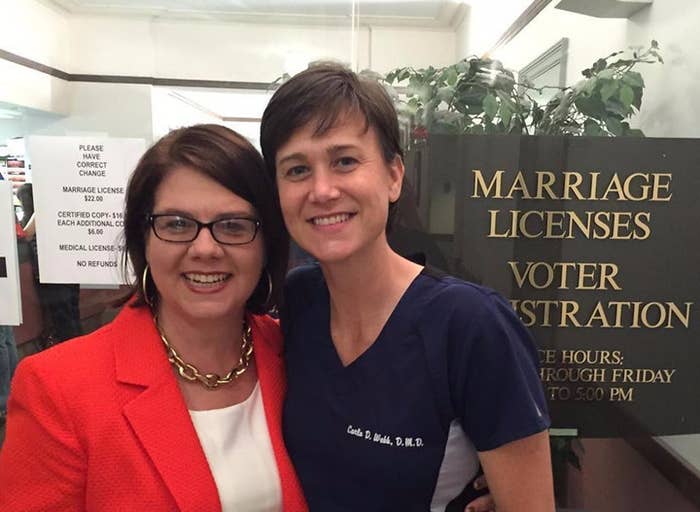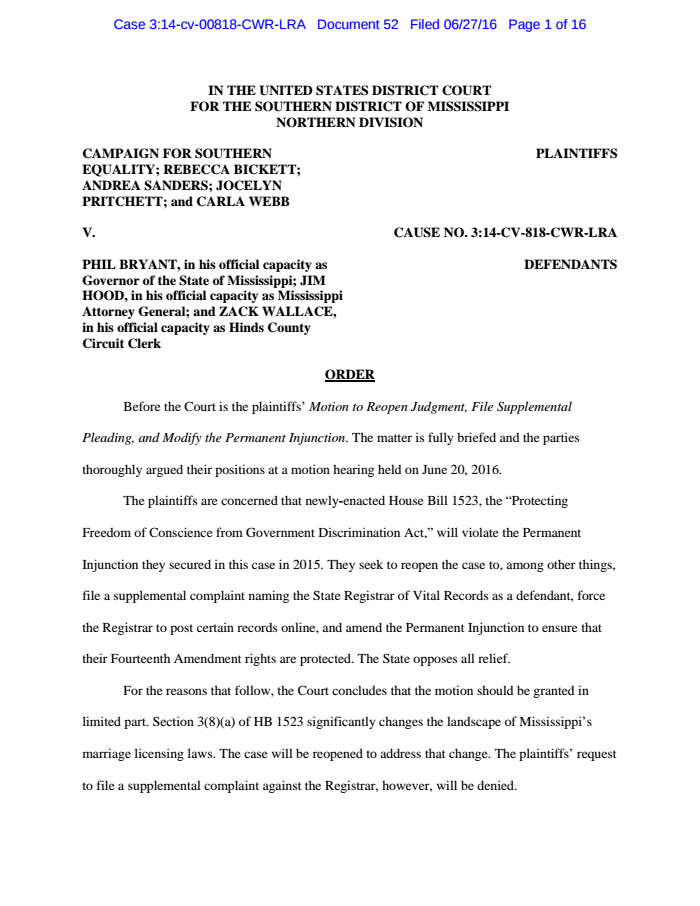
WASHINGTON — A federal judge on Monday ruled that Mississippi's recently passed law that allows county clerks to recuse themselves from issuing marriage licenses based on their religious beliefs was, effectively, an impermissible attempt to get around the Supreme Court's marriage decision.
"[T]he Supreme Court's ruling will be enforced," U.S. District Court Judge Carlton Reeves wrote of the year-old decision in Obergefell v. Hodges.
There was already a court order that stopped Mississippi from enforcing its ban on same-sex couples' marriages. On Monday, the judge agreed to expand that order to address the so-called "recusal" provision of HB 1523, which was passed earlier this year and would go into effect on July 1.
"Having reviewed the relevant section of HB 1523, the parties’ arguments, and the scope of the Supreme Court’s ruling in Obergefell, the Court finds that [the recusal provision] may in fact amend Mississippi’s marriage licensing regime in such a way as to conflict with Obergefell," the judge wrote.
Reeves, who initially heard the marriage ban challenge starting in 2014, heard arguments June 20 on the request to re-open the case. Roberta Kaplan of Paul Weiss, the lawyer who successfully represented Edie Windsor in her challenge to the Defense of Marriage Act, is leading the legal team representing the same-sex couples who are challenging the Mississippi provision.
Writing that "Section 3(8)(a) of HB 1523 significantly changes the landscape of Mississippi’s marriage licensing laws," Reeves concluded, "The case will be reopened to address that change." Reeves also, however, denied the plaintiffs' second request, which was to file an additional complaint in the case against the state's registrar.
Regarding the request to reopen the case to address the effect of the recusal provision, Reeves began by explaining the initial purpose for the lawsuit.
"The constitutional violation this case addressed in 2014 and 2015 was whether the Fourteenth Amendment permitted a State to treat same-sex couples differently than opposite-sex couples with respect to the issuance and recognition of marriage licenses," he wrote.
Then, examining the new request, he concluded, "Today’s motion concerns the same issue. In [the recusal provision], the State is permitting the differential treatment to be carried out by individual clerks. A statewide policy has been ‘pushed down’ to an individual-level policy. But the alleged constitutional infirmity is the same."
Reeves was particularly critical of the decision of state officials to respond to the Obergefell ruling by passing such a law and taking other related actions aimed at avoiding the existing injunction.
"The Fifth Circuit long ago chastised our State for such 'a carefully calculated campaign of delay . . . and masterly inactivity,'" Reeves wrote, citing a 1962 decision from Judge John Minor Wisdom lambasting the state of Mississippi's efforts to prevent racial integration of the University of Mississippi.
As to today's issue, Reeves noted, "Mississippi’s elected officials may disagree with Obergefell, of course, and may express that disagreement as they see fit – by advocating for a constitutional amendment to overturn the decision, for example. But the marriage license issue will not be adjudicated anew after every legislative session."
Reeves has now ordered the parties "to confer about how to provide clerks with actual notice of the Permanent Injunction" because there remained a question as to whether all of the state's clerks had received formal notice that the marriage ban is unenforceable. He also order the parties to discuss "appropriate language to include in an Amended Permanent Injunction."
Reeves also has before him a more broad challenge to HB 1523, arguments over which were held last week as well.

